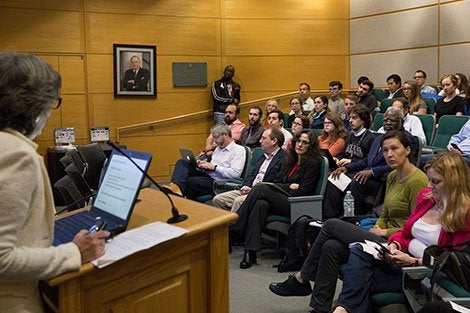November 1, 2017—Although the recent outbreaks of Zika in Brazil and Ebola in West Africa have subsided, it would be a mistake for public health practitioners to lower their defenses, according to a panel of experts convened at Harvard T.H. Chan School of Public Health. There is still much more work to be done, they said. Survivors struggle with the health and social consequences of their illnesses—and the next outbreak of these or other viruses may be right around the corner.
The researchers spoke at The New Era of Epidemics: Surveillance, Response, Impacts, and Challenges, a symposium held on October 26, 2017 as part of Harvard’s Worldwide Week. The event was sponsored by the Center for Communicable Disease Dynamics (CCDD) at Harvard Chan School, Harvard University David Rockefeller Center for Latin American Studies, Defeating Malaria from the Genes to the Globe Initiative, and the Radcliffe Institute for Advanced Study.
In opening remarks, Marc Lipsitch, professor of epidemiology and director of the CCDD, described a rise in recent years of reports of infectious disease clusters. These can be explained in part by changes to the environment and demographics that help diseases spread—warmer, mosquito-friendly weather and larger, more mobile populations—but also by better surveillance and reporting of outbreaks. He said that it is important to maintain focus on infectious diseases during the “peacetime” between outbreaks, by building up networks of collaborators and employing new and time-tested techniques—such as genome sequencing and epidemiological surveys—to monitor and stop viruses before they spread out of control.
Marcia Castro, associate professor of demography, spoke about the challenges that continue to face Zika and Ebola survivors and their families. Many children of Zika-infected mothers were born with microcephaly, a severe birth defect that causes abnormally small heads. These children require intensive amounts of care, and the burden falls heaviest on Brazil’s poorest families. In West Africa, children who survived Ebola are experiencing cataracts caused by the virus, and stigma around the disease remains high.
While the School’s infectious disease work has global reach, it also can take a more local flavor. Pardis Sabeti, professor of immunology and infectious disease, who gained prominence for her leadership in the effort to sequence the Ebola genome and track its mutations, recently helped Harvard’s administration study a mumps outbreak on campus and develop an app for students to manage flu care.
Sabeti spoke about the importance of “roots not parachutes” in global infectious disease control, meaning that the work to build networks and capacity in countries will ultimately be more effective in stopping outbreaks than outside experts who arrive during a crisis.
Other speakers included Celina Turchi Martelli, a Brazilian researcher who said that her government’s decision to declare Zika an emergency helped the country’s public health and medical communities come together to address the crisis. Jessica Metcalf of Princeton outlined the virus surveillance potential of testing antibodies in blood bank samples around the globe. Anne Rimoin of UCLA said that the most important countries to monitor for outbreaks are those that are the hardest to get to. Rimon, an epidemiologist, has worked extensively in the Democratic Republic of Congo, where roads are poor or non-existent, many villages don’t appear on a map—and eight Ebola outbreaks have occurred since 1976.
Photo: Sarah Sholes
